
Category Archives: Uncategorized
Top 10 Issues Affecting Real Estate in 2021

Share
June 24, 2021
Remote work and mobility are expected to have the most significant impact on real estate over the next year, according to The Counselors of Real Estate’s list. The group identified current and emerging issues expected to have an influence over real estate in the 2021-2022 cycle. Remote work and mobility and its influence over commercial buildings globally was named as the top issue, followed by technology and ESG (Environment, Social, and Governance).
“The pandemic was a stress test, revealing vulnerabilities, appetites, and new and increased risks,” says Michel Couillard, global chair of The Counselors of Real Estate. “These themes present themselves in the 2021-2022 Top Ten Issues, which are highly interconnected and indicative of a newly changed and further evolving real estate environment. We have been awakened to some familiar but nascent areas of importance, namely cybersecurity, supply chain, and price instability. None of these are new concepts, but in a span of months or even just weeks, we saw high profile hacks, shortages of resources like microchips, lumber and labor, and rising prices across the board.”
Here’s a closer look at the top 10 issues on CRE’s list for 2021-2022:
1. Remote work and mobility
The pandemic greatly disrupted the workplace as many employees began to work remotely—and still are more than a year later. Commercial properties may need to be repositioned as the workplace adapts to more flexible and even shareable spaces.
“As we emerge from COVID-19 into a new world replete with local and global disruptions alike, our industry has been forced to recognize that adaptability and resiliency are paramount in real estate markets,” says Couillard. “It is undeniable that the pandemic’s disruption significantly impacted human behavior in how and where people have chosen to work. Now, with an escalating return to ‘business as usual,’ and workers beginning to return to offices, landlords, and companies nevertheless are facing repositioning of the workspace and the benefit of easily adaptable and shareable spaces. …. Property owners and managers should be flexible in order to accommodate these demand-driven changes in the desired use and location of space.”
2. Technology acceleration and innovation
The Counselors of Real Estate also ranked the acceleration and adoption of technology as having the second greatest impact on the real estate industry. “The stressors were not about new tech, but about the acceptance of it,” Coulliard says. “Lockdown-driven changes in our work, the economy, in social structures, and in our personal behavior forced the industry to put any earlier reluctance aside.” Growing technology themes include artificial intelligence, machine learning, the Internet of Things, and cybersecurity, the report notes.
3. ESG at a tipping point
Environmental, social, and governance (ESG) initiatives are growing. In 2020, ESG funds more than doubled net new money intakes. “The growth in recent years is fueled by multiple drivers, including consumer shifts, regulatory requirements, trillions of dollars of wealth transferring to generation Z and millennials committed to philanthropic living, a blurring of work and societal expectations, and a full sprint to attract and retain top talent,” the report notes.
4. Logistics
“Whether it’s a port, rail line, pipeline … manufacturing facility, warehouse, farm, ranch, or grocery store, all these real estate assets are a critical segment in the supply-chain funnel that is logistics,” the report notes. “How logistics is functioning impacts the utilization of commercial real estate. Redundancy and the ability to process disruption are two key elements required to support the fast-moving, high-volume requirements of modern-day logistics in the ‘shop-online-and-deliver-to-me’ era in which we find ourselves.”
5. Infrastructure
The Civil Engineers estimates the U.S. infrastructure funding gap in 2021 to be $2.6 trillion, a 24% increase compared to 2017. “The COVID-19 pandemic, climate change, and heightened societal interest in social and economic equity have redefined infrastructure imperatives beyond the significant ongoing necessity for improved roads, bridges, airports, ports, mass transit, and other traditional infrastructure needs,” the report notes. A proposal on Capitol Hill sets out to allocate $110 billion in new spending to bridges and roads, $65 billion to expanding access to broadband, and $48.5 billion to public transit, and more. Stay updated here: NAR resource page on transportation and infrastructure in real estate
6. Housing supply and affordability
The National Association of REALTORS® and the Rosen Consulting Group released a report last week calling for a “once-in-a-generation” response to address decades of underinvestment and underbuilding in the housing market. The nation has faced a shortfall of 5.5 million to 6.8 million housing units since 2001, according to the report. Housing groups are calling on lawmakers to expand access to resources, remove barriers to incentivize new development, and more. Read more from NAR’s report on this: ‘The State of America’s Housing Stock Is Dire’
7. Political polarization
“Political friction is holding back America’s economic productivity,” the report notes. “We are squandering resources as we try to address problems that arise from the partisan divide rather than problems confronting us as common issues …. And the real estate industry’s well-being is a function of our economic growth.”
8. Economic structural change
Economic growth is mostly an unknown. As the report notes, how do we assess the real potential of the economy for sustainable growth? What numbers indicate a true trend and which are merely adjustments from the low bottom of the second quarter of 2020? Which behavioral changes made by U.S. households in the pandemic will persist? The ability for businesses to anticipate what’s next is met with challenges. For example, “even though real estate investors may reasonably expect an uptick in demand in the coming year, the ability to anticipate when occupancy and rent will rise frustrates underwriting,” the report notes. “We are observing many investors increasing their focus on property management aimed at retaining tenants and defending cash flow, while selectively seeking ‘value-add’ properties amenable to active asset management. The thinking is ‘focus on what you can control’ during this period where macro-level uncertainty is the governing headwind at the policy level in terms of the structural problems in this economy.”
9. Adaptive Reuse 2.0
The term is not new but the focus is getting bigger. CRE refers to Adaptive Reuse 2.0 as “The Neighborhood Approach.” It aims to address the challenges of what to do with defunct suburban malls and thousands of empty big-box retail stores that are surrounded by desirable and affordable neighborhoods. It requires a re-examination of suburban communities in repositioning and transforming areas that could be at risk for blight. A number of projects have been completed or are underway to help reconnect communities, prevent blight, and restore green space.
10. Bifurcation of capital markets
Debt capital markets have been volatile since the pandemic, namely public markets like commercial mortgage-backed securities, mortgage REITs, and agencies such as Freddie Mac and Fannie Mae. “Mortgage REITs took a significant hit early in the pandemic, with some recent recovery driven by restructuring credit lines and paying down credit facilities that experienced margin calls,” the report notes. Still, the “market continues to be flush with debt capital liquidity, despite property type and market uncertainty. Looking out to the remainder of 2021 and into 2022, performance will dictate the amount of distress and losses, and risk management should dictate markets, property types, leverage, loan structure, and pricing for mortgage debt. The next year should also tell us if commercial real estate debt was too rich and whether perceived risk underestimated where pricing should have been.”
Learn more about each of these issues: Cre.org/topten
6 Tips to Bring Your Curb Appeal Back to Life This Summer
Selling the outside of a home is just as important as selling the inside. Here are ways to instantly give the exterior an update.
Share
July 5, 2021Design & Architecture
Submitted by HomeLight(link is external)
If you’re looking to cash in on this booming seller’s housing market,(link is external) you may want to put more focus on the home’s exterior. A home’s outward appearance plays a big role in whether potential buyers want to tour the interior. HomeLight, a real estate referral company, offers up several ways to give the home’s curb appeal an instant makeover:
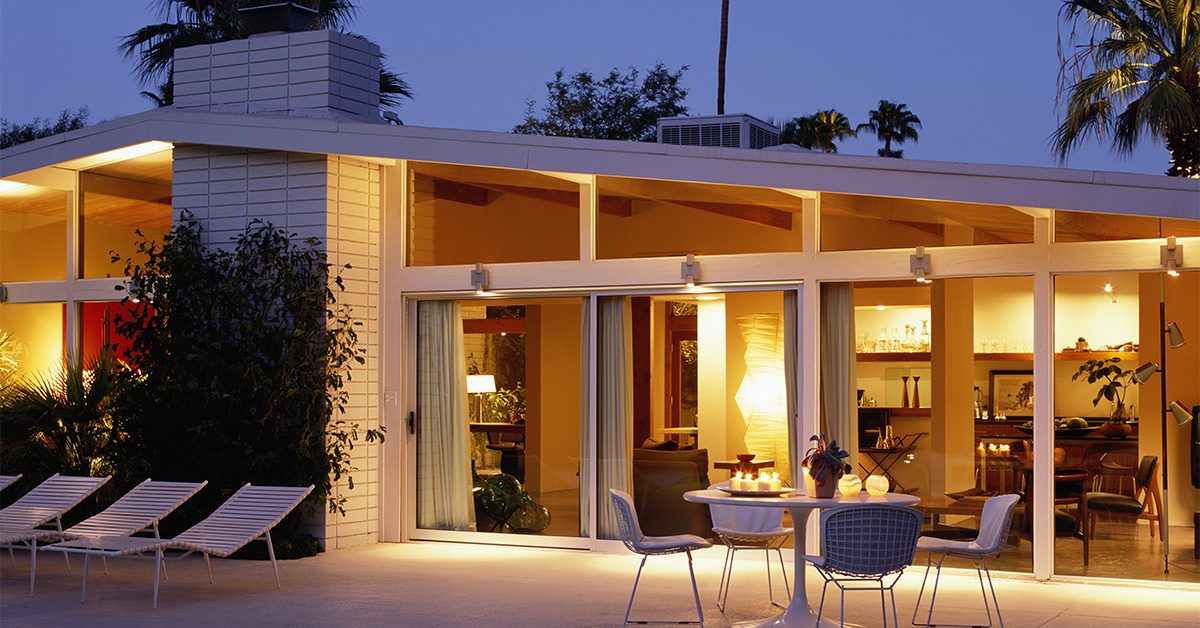
1. Update the light fixtures
Updated light fixtures can change the way the front of a house looks but has an added benefit of making it safer when you use brighter bulbs too. Most outdoor lighting fixtures are much smaller than they should be. (That may had been intentional on the builder’s side; smaller fixtures are less expensive.)
Tip for choosing the right fixture: When you’re choosing a new light fixture, take cues from the home’s architecture, color, and your location. For the size, choose a fixture that’s one-third of the height of the door if you have only one light and one-quarter the height if you have a light on both sides of the door.
2. Upgrade windows and doors
Updating your windows and doors are a great way to improve the overall look of your home while also being energy-efficient. Consider adding window boxes, shutters, or even painting the trim for an added pop of color.
When upgrading the front door, be sure to choose a new door that matches the home’s style. Or you could follow the latest front door trends for 2021–glass elements, custom hardware, wood stains, or darker paint colors.
3. Paint
Painting your house is a huge task, but it can pack a huge punch! Just imagine the statement you’d make by ditching the boring beige, dulled white, or dated yellows. If you want to modernize your house, consider painting the house black or navy blue. Or, if you want to achieve that comfy-cottage look, try a light shade of gray or even a very pale shade of pink.
4. Add wood and/or stone elements
Adding wood or stone elements to the exterior can help give a home a “wow” factor. Even if you don’t want to put stone veneers on the exterior, you could add stone and wood elements in other ways, like by using stone to line the walkway, a wooden fence, or even stone or wooden lawn ornaments.
5. Hire a professional landscaper
There’s a huge difference between do-it-yourself landscaping and landscaping that’s completed by a professional. A professional landscaper can make your lawn a luscious green carpet that’ll make you want to kick off your shoes. They’ll know which native plants to choose to make a yard warm and inviting. They can also create water features, intricate flower beds, build retaining walls, and more.
6. Refinish walkways and the driveway
The walkways and driveway get a lot of use, and all that wear and tear will need an update over time. A professional landscaper or hardscaper also can upgrade your driveway and walkway by using stone, brick, or cement. But if you’re on a budget, a good power-washing may also give a curb appeal boost.
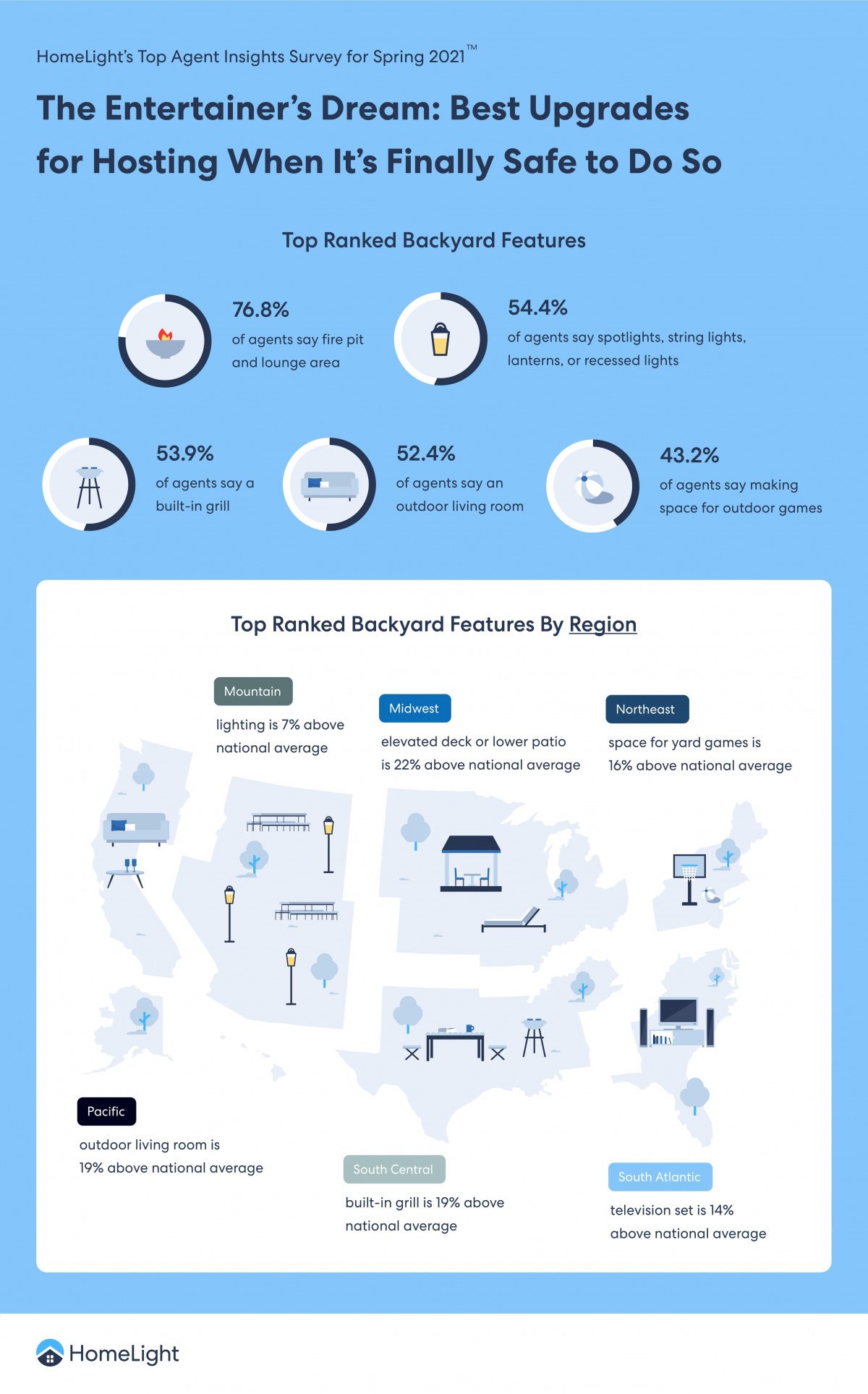
Subscribe(link is external) to receive weekly home staging tips and design trends delivered directly to your inbox from the Styled, Staged & Sold blog.
More Homebuyers Making 20% Down Payments and Waiving Appraisal and Inspection Contract Contingencies
Share
June 23, 2021Mortgage Financing, FHA Programs, Veterans AffairsBy: Scholastica (Gay) Cororaton
Homebuyers who make a 20% down payment and waive appraisal and inspection contingencies are on the rise, based on the May 2021 REALTORS® Confidence Index (RCI) Survey which reports monthly transactions from a random sample of REALTORS®1.
Among all buyers2 who obtained a mortgage in May, the share of mortgages associated with at least a 20% down payment rose to 52% in May 2021, up from around 40% in 2011. Among first-time buyers, nearly one in three made a down payment of at least 20%, up from around 25% in 2011. This trend reflects the decline in the share of buyers who obtain mortgages insured by the Federal Housing Administration (FHA) and the Veterans Administration (VA) which insure zero and low downpayment loans.

Buyers With Conventional Financing Edge Out Potential Buyers Obtaining FHA and VA Loans
According to information provided by REALTORS®, conventional conforming mortgages (mortgages that conform to guidelines set by Fannie Mae and Freddie Mac), accounted for 74% of mortgages obtained by homebuyers in May 2021, an increase from about 65% during 2018 through 2019. Meanwhile, the share of FHA-insured mortgages to total mortgages in fell to 14% in May 2021 from about 20% in past years. The share of VA-guaranteed loans has also decreased to 7% in May 2021 from about 10% in past years.
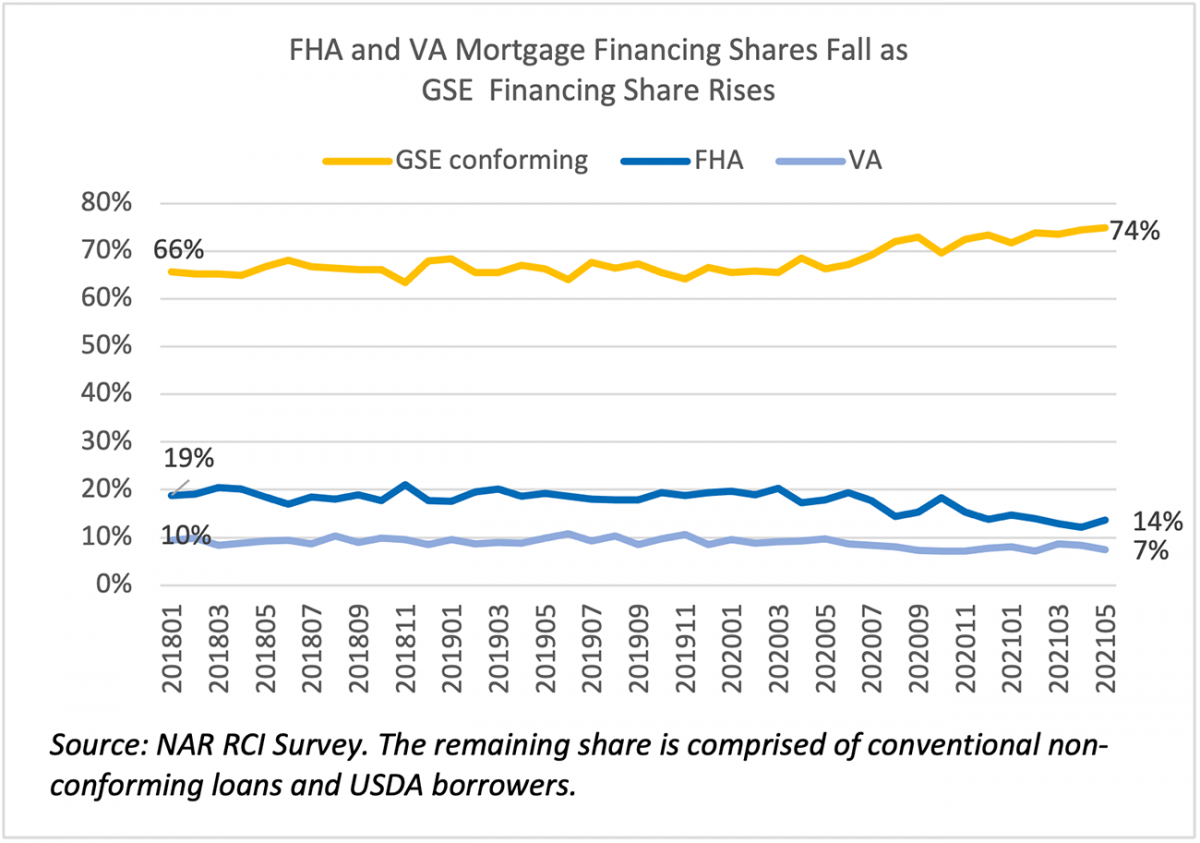
Highly Competitive Market Is Resulting in Appraisal and Inspection Waivers on Contract Contingencies
According to REALTORS®, sellers are wary of the appraisal and inspection process. REALTORS® have reported that buyers who make an offer using FHA or VA financing find it hard to compete against other buyers who are offering cash or using conventional financing.
“It is extremely difficult for FHA/VA buyers to get accepted in a multiple offer situation. They are on the bottom of the hierarchy”
“Buyers using VA Loans are being discriminated due to ‘known low appraisals with VA loans’ which is not right at all.”
“VA Loans are at a complete disadvantage — sellers need to be offered an incentive to give more consideration to a VA Loan offer. There are a lot of misconceptions regarding VA appraisals and VA loans.”
Appraisals present a hurdle for homebuyers with VA and FHA financing at a time when prices are rising fast and homes are selling swiftly with little inventory on the market. In May 2021, the total inventory of homes (unsold) on the market was equivalent to 2.5 months of the monthly sales pace, well below the ideal level of 6 months. Appraisals, which are based on comparable sales and/or automated valuation, will always lag behind the “real-time” price based on current demand-supply fundamentals. In May 2021, the median existing-home sales price rose at a record high of 24% year-over-year, the highest annual pace since 19693. VA appraisals take anywhere from 5 to 15 days4, but properties are typically on the market for 17 days.
Homebuyers are waiving appraisals in order to close the transaction quickly. REALTORS® reported that among contract contingencies waived by the buyers, the most common contingency that buyers waived was the appraisal contingency (28%) followed by the inspection contingency (25%).

Homebuyers who are able to waive contract contingencies are those who pay cash or use conventional financing. In contrast, FHA and VA buyers are not able to waive the appraisal or inspection contract contingencies according to FHA and VA guidelines. The home inspection assesses the condition of the home and the property location to ensure that the home meets minimum property requirements (MPRs) pertaining to the safety, structural soundness, and sanitary conditions (e.g., space requirements, entry/exit, drainage, topography, HVAC systems, gas connection, roofing/crawl spaces, lead/radon, etc.).5
FHA inspection standards may be tougher to meet, especially for sellers who want to sell the home “as is.” For example, the FHA inspection guidelines require that the “heating unit is adequate and in good working condition,” the “water heater in good working condition,” that there are “working smoke detectors in the home,” and that the “sink in good working condition and with no leaks.” In fact, FHA standards sometimes even involve stipulations beyond the house itself (e.g. “If the home is in close proximity to an airport and its flight pattern, that may result in extreme noise hazards that could disqualify the home from being financed with an FHA loan.”).6
While inspection standards are important for ensuring that buyers are protected, they can create a disadvantage for prospective homebuyers in a highly competitive housing market. First-time homebuyers, buyers with less than excellent credit scores (FHA borrowers can have a credit score of as low as 580), and low-income and low-asset borrowers who are not able to afford a 20% down payment are mostly likely to get disadvantaged.
A home is the largest investment most people make in their lifetime. Buyers should be protected so that the price paid for the home is worth its value. Unfortunately, in a housing market where sales are moving swiftly, the time to undertake the inspection and appraisal is creating a hurdle for buyers obtaining FHA-insured loans who are typically first-time buyers and buyers obtaining VA-guaranteed loans.
1 The May 2021 survey was sent to 50,000 REALTORS® who were selected from NAR’s more than 1.4 million members through simple random sampling and to 5,876 respondents in the previous three surveys who provided their email addresses. There were 3,316 respondents to the online survey which ran from June 1-8, 2021; among these respondents, 1,653 had a client. NAR weights the responses by a factor that aligns the sample distribution of responses to the distribution of NAR membership.
2 The RCI Survey asks the respondent about the characteristics of their last transaction during the month. These transactions make up a random sample because the characteristic of the last transaction (e.g., whether the buyer obtained government or conventional financing) is random.
3 NAR started tracking single-family existing home sales since 1969 and total existing-home sales (single-family and condos/coops) since 1999. Single-family home sales make up 88% of existing-home sales in May 2021.
4 VA Appraisal Fees and Timeline Schedules, https://www.benefits.va.gov/HOMELOANS/appraiser_fee_schedule.asp(link is external)
5 Chapter 12, Minimum Property Requirement, https://benefits.va.gov/WARMS/docs/admin26/m26-07/Ch12_Minimum_Property_Requirement_NEW.pdf(link is external)
6 Ibid, https://fhalenders.com/fha-inspection/(link is external)

Scholastica (Gay) Cororaton
Research EconomistScholastica Gay Cororaton is the Research Economist for the National Association of REALTORS®.
MAY 2021 SALES leaders
Home stagers show how lighting can improve a home’s presentation for showings and online photos.
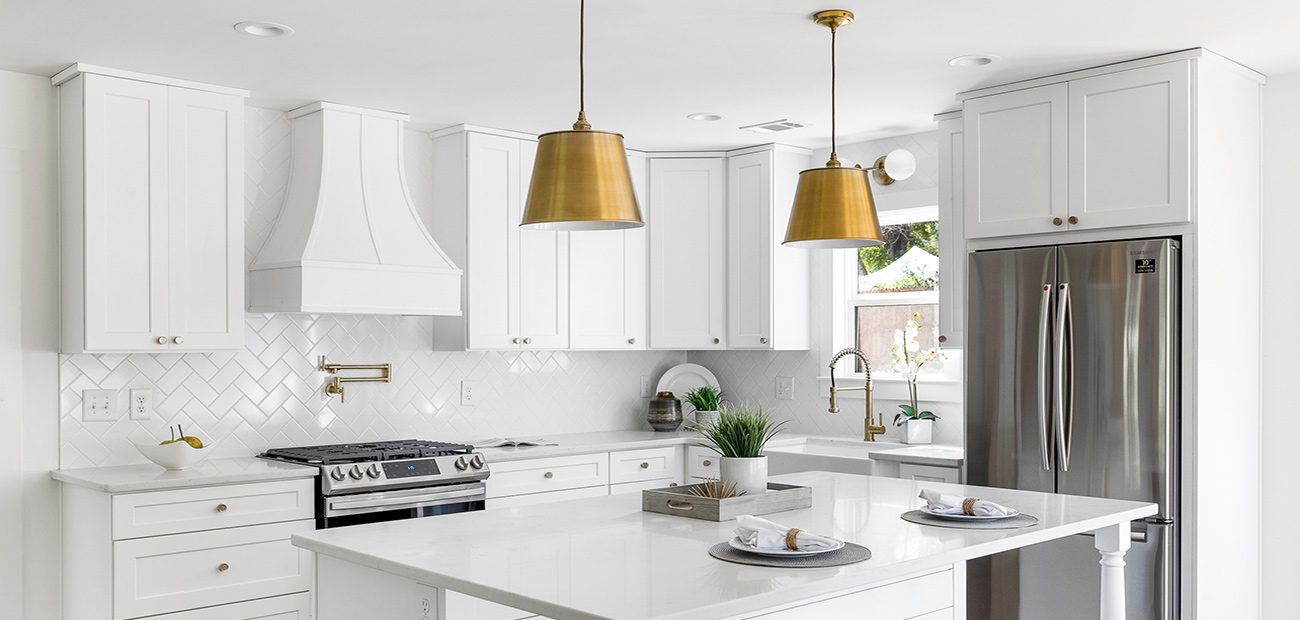
May – June
2021
by Melissa Dittmann Tracey
Key Takeaways
A home with dated lighting fixtures is a major turnoff to potential buyers, say 45% of 1,000 surveyed real estate pros.
Decorative lighting chandeliers and pendants in geometric shapes and in brass or gold metals are among the hottest design trends.
Home stagers advise using soft white lightbulbs and layering in lights—using overhead fixtures, lamps, and natural light—to achieve the most inviting light.
Lighting matters for making strong impressions. In a 2020 survey of 1,000 real estate professionals conducted by HomeLight, a real estate referral company, 45% of respondents said a home with outdated light fixtures can be a big turnoff to potential buyers. Decorative light fixtures—often referred to as the “jewelry” of home design—and natural light can instantly change the feel and look of a space.
Home stagers offer up four ways to help find the right light for your properties.
- Swap out dated light fixtures. Decorative lighting that makes an artistic, sculptural statement is a growing trend in home design. Bell says popular fixtures for chandeliers or pendants include geometric or ball-clustered shapes, spiral chandeliers, and gridded honeycomb compositions. Many of these fixtures are in gold and brass metals to make them a room’s focal point, says home stager Krisztina Bell, founder of No Vacancy Inc. and Virtually Staging Properties Inc. in Atlanta. “Builders, flippers, and investors are renovating and updating homes to impress potential buyers, and lighting is one of the features they’re going all out on to really make a statement,” Bell says.
- Filter in natural light. Dated window treatments—like valances, drapes, and curtains—not only block natural light but also risk making your sellers’ home look outdated, said nearly half of real estate pros in HomeLight’s survey. “Let as much daylight into the room as possible,” says Audra Slinkey, president and founder of Home Staging Resource, a training center for the staging industry. “Usually this is best done by removing dated window coverings and trimming back greenery on the outside.”

Geometric Lights
© No Vacancy Home Staging
Overgrown shrubbery can also block light and any picturesque views. Bell says her team of stagers often recommends removing drapes and opening blinds—and pulling them all the way up—to expose windows. This creates “less distraction so buyers focus on seeing themselves living in a home, not observing the purple curtains or heavy traditional gold draperies left behind,” Bell says. “Ensure the sun’s rays are flooding into the property as much as possible.”
- Use softer bulbs. Swap out high-intensity lightbulbs for warm or soft white ones with a lower Kelvin rating, Slinkey suggests. “The best lightbulbs to purchase for lamps are LEDs with Kelvins at 2700 to 3500 tops,” Slinkey says. “They give the most flattering light to a living space.” Keep all the lightbulbs at the same wattage. “Consistency is key in good lighting, especially for taking photos of a staged home,” Bell adds. “A mix of cool and warm tones can make it challenging for photographers to get that perfect shot.”
- Layer in the lights. Don’t rely solely on overhead fixtures to light up spaces. “Stagers often will layer the lighting with at least two table lamps and possibly a floor lamp, depending on the size of the room,” Slinkey says.
Using lamps for uplighting against a wall can make a room feel taller. Height and scale matter, too.
To layer lighting near a standard-sized sofa and side table, Slinkey suggests that the combined height of the table and lamp should be 58 to 66 inches. “In a room where people are moving around, it prevents them from having to look into the bulb from either a seated or standing position,” Slinkey explains.
And lighting that sits too high can appear disconnected from the sofa or other adjacent seating.
Dimming can also help highlight certain room features. A dining room becomes more dramatic if there is lower light on the periphery and brighter light on the table, especially if the light is showing off crystal and silver on the table, says Al DeGenova, a longtime lighting industry marketing executive.
Bulbs and windows aren’t the only light sources at your disposal—reflective objects such as mirrors can work, too. “Mirrors can be placed opposite a window, over a fireplace, or near a lamp to reflect the ambient light in the room and have a multiplying effect,” Bell says. Plus, “oversized mirrors that lean against a wall can help a room appear larger.”
See Getting the Right Light to better understand the variety of lightbulbs available today and how to chose the right ones for a home.
Melissa Tracey
Melissa Dittmann Tracey
Contributing Editor
Melissa Dittmann Tracey is a contributing editor for REALTOR® Magazine. She can be reached at mtracey@nar.realtor. Follow her on Instagram and Twitter: @housingmuse
Make Your Spring Listing Shine With Updated Style
Homes are selling quickly, but buyers still want a move-in-ready property that fits today’s styles.
Share
March 22, 2021StagingBy: Patti Stern
by Patti Stern
While the housing market has seen a boom in homebuying demand since the onset of the pandemic, inventory is lacking and will most likely continue to be limited. That doesn’t mean active spring buyers will settle for less than the best. Today’s buyers continue to look for properties that feel move-in-ready and those they can easily envision living in. That means updating outdated decor with modern styling to get the most bang for your real estate buck.
The transformations below feature homes recently staged by our team that pair the homeowner’s furnishings with neutral wall colors, on-trend accents, and new arrangements to add engaging, fresh appeal.
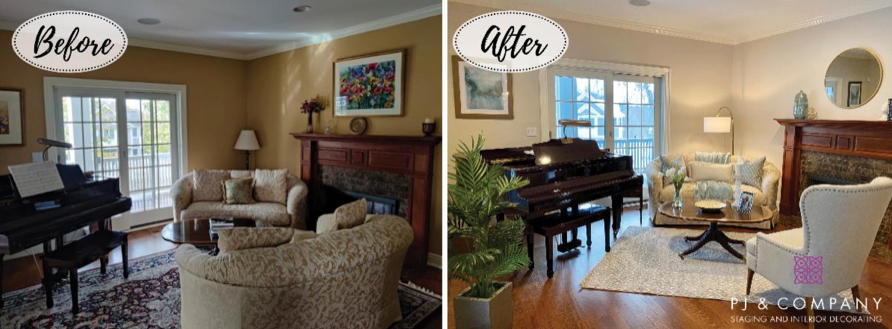
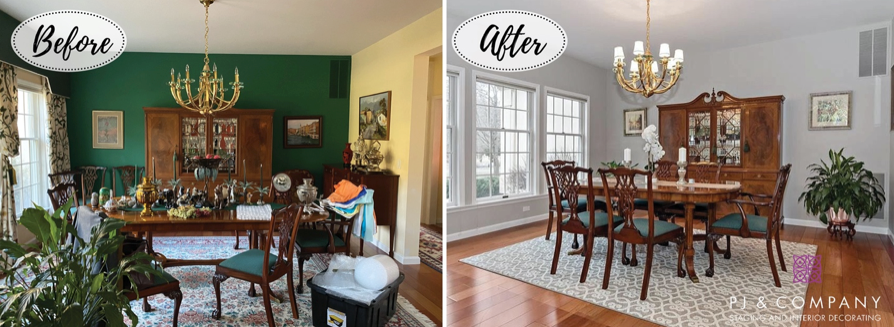
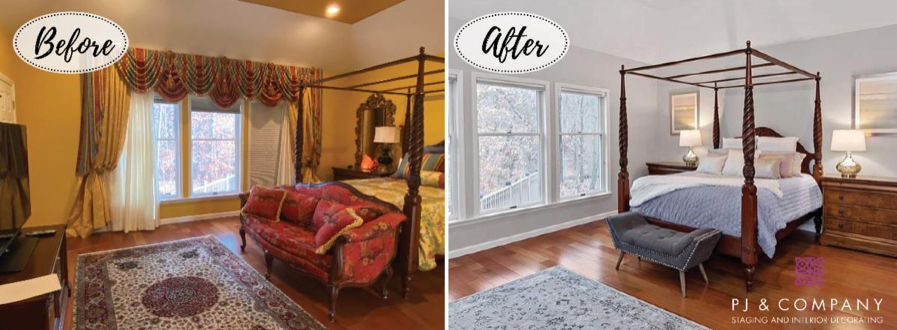
For each of the rooms pictured above, we kept most of the existing furniture and added neutral paint, removed dark curtains, and replaced outdated accents with modern rugs, wall art, accent chairs, bedding, and pillows.
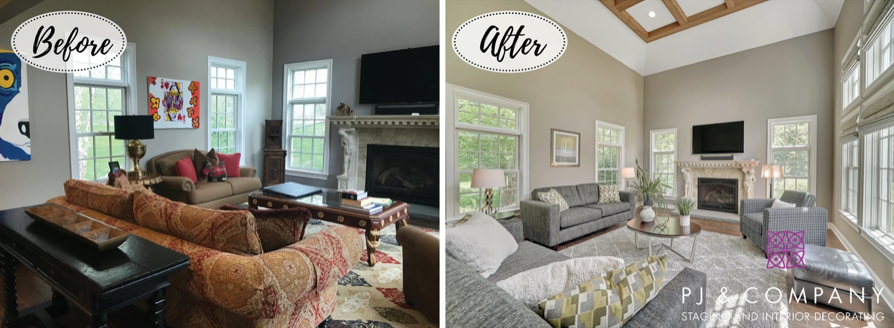
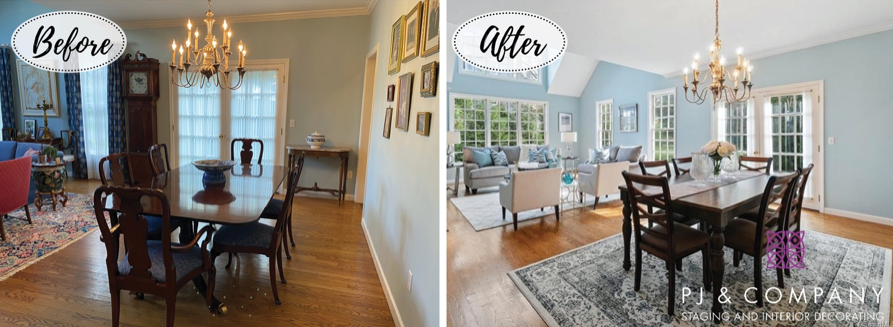
To update, brighten, and showcase the distinctive features of the rooms pictured above, we completely removed the sellers’ furniture and curtains and replaced them with neutral pieces that had cleaner lines and modern accents.
For more examples of interior decorating and home staging, visit PJstagingdecorating.com.(link is external)

Patti Stern
Patti Stern, principal, interior decorator and professional stager of PJ & Company Staging and Interior Decorating, has been decorating and staging homes since 2005.
25 DIY Pallet Wood Projects
Written by Lee WallenderUpdated 01/28/21
:max_bytes(150000):strip_icc():format(webp)/diy-wood-pallet-projects-4157685-03-b7c0a1c6dcb2494093551f39c670d608.jpg)
Free for the taking and bursting with raw style, pallet wood has quickly become a favorite building material for savvy do-it-yourselfers. Pallet wood board is unique and there is rarely a need to distress this wood since most of it gains a natural, rich patina from exposure to the elements.
Without a doubt, you will absolutely relish making these do-it-yourself wood pallet projects. They are a fun and economical way to create a lively home and garden with a style that straddles edgy and traditional for truly a modern rustic look. Accessible to anyone with the motivation to source street-side pallet materials, most projects require only tools that you may already have on hand. With little more than a prybar, hammer and nails, cordless drill, and saw, you’ll be able to construct most of these do-it-yourself pallet projects in a day or two.
- 01of 25Pallet Herb Garden Wall
:max_bytes(150000):strip_icc():format(webp)/PalletHerbGardenWall-5a5e0824d92b090036e35ca9.jpg) Messy ArtYou’ll break Instagram the minute you post this utterly charming pallet herb garden wall. Artist Zina and her husband mounted a full pallet on the backyard side of their house. Plastic potting trays fit neatly between the slots. The finishing touch: herb names painted on the garden wall in fancy script. Pallet Herb Garden from Messy Art
Messy ArtYou’ll break Instagram the minute you post this utterly charming pallet herb garden wall. Artist Zina and her husband mounted a full pallet on the backyard side of their house. Plastic potting trays fit neatly between the slots. The finishing touch: herb names painted on the garden wall in fancy script. Pallet Herb Garden from Messy Art - 02of 25Wood Pallet Entryway Ceiling
:max_bytes(150000):strip_icc():format(webp)/PalletCeilingEntryway-5a5d5f06845b3400377a8fa3.jpg) Cape 27 BlogSelf-described “interior design fanatic” Jessie at the home lifestyle blog Cape 27 spent next to nothing on a wood pallet living room wall, which left her extra materials. What to do? She continued the rustic look by tacking up the pallet boards to her exterior porch ceiling. This oh-so-simple project was as easy as taking down the light, power nailing a perimeter and field boards, then replacing the light. Exterior Entryway Pallet Ceiling from Cape 27 Blog
Cape 27 BlogSelf-described “interior design fanatic” Jessie at the home lifestyle blog Cape 27 spent next to nothing on a wood pallet living room wall, which left her extra materials. What to do? She continued the rustic look by tacking up the pallet boards to her exterior porch ceiling. This oh-so-simple project was as easy as taking down the light, power nailing a perimeter and field boards, then replacing the light. Exterior Entryway Pallet Ceiling from Cape 27 Blog - 03of 25Wood Pallet Outdoor Table With Succulent Garden
:max_bytes(150000):strip_icc():format(webp)/PalletOutdoorTable-5a5e0f93482c52003b397e89.jpg) Morning ChoresDo you have an old, disused table? You’ll have this upcycled pallet project done in a snap. Face-nail or screw pallet boards to the top of the table, clear coat them, and you’re done. For a delightful extra touch, omit a center pallet board and replace with a low, 2-inch high potting tray and fill with succulents.Outdoor Table from Morning Chores
Morning ChoresDo you have an old, disused table? You’ll have this upcycled pallet project done in a snap. Face-nail or screw pallet boards to the top of the table, clear coat them, and you’re done. For a delightful extra touch, omit a center pallet board and replace with a low, 2-inch high potting tray and fill with succulents.Outdoor Table from Morning Chores - 04of 25Wood Pallet Bed Headboard
:max_bytes(150000):strip_icc():format(webp)/PalletHeadboard-5a5e3c2289eacc00374af5da.jpg) StylizimoSatisfy your inner rustic-chic soul with this inventive pallet bed headboard. Source two pallets, thoroughly pressure wash them, and let dry for several days before attaching to your bed frame. You can clear coat them with satin polyurethane or leave the wood unfinished for a mixture of the primitive and the sophisticated.Pallet Headboard from Stylizimo
StylizimoSatisfy your inner rustic-chic soul with this inventive pallet bed headboard. Source two pallets, thoroughly pressure wash them, and let dry for several days before attaching to your bed frame. You can clear coat them with satin polyurethane or leave the wood unfinished for a mixture of the primitive and the sophisticated.Pallet Headboard from Stylizimo - 05of 25Wood Pallet Radiator Cover
:max_bytes(150000):strip_icc():format(webp)/PalletRadiatorCover-5a5e3fe9c7822d0037850ce1.jpg) LantlivRadiators rank high on the list of unsightly home fixtures that cannot be removed. One way to hide your radiator is with possibly the least expensive radiator cover ever: a wood pallet. Simply knock off one side of boards with a hammer or pry bar. After cleaning it, you can place it in front of your radiator for instant coverage.Pallet Radiator Cover from Lantliv
LantlivRadiators rank high on the list of unsightly home fixtures that cannot be removed. One way to hide your radiator is with possibly the least expensive radiator cover ever: a wood pallet. Simply knock off one side of boards with a hammer or pry bar. After cleaning it, you can place it in front of your radiator for instant coverage.Pallet Radiator Cover from Lantliv - 06of 25Wood Pallet Kitchen Backsplash
Circa DeeWant a real conversation piece in your kitchen? This do-it-yourself wood pallet backsplash fits the bill. Entrepreneur and antiques dealer Dana, of the design blog Circa Dee, wanted to spiff up her dated galley kitchen. A few pallets later, she had an inventive backsplash that got friends and family talking. She cut the boards into 18-inch sections and left the wood raw for maximum weathered effect. Alternatively, you may choose to seal the pallet boards for protection against moisture.Pallet Backsplash from Circa Dee
- 07of 25Wood Pallet Bookshelf
:max_bytes(150000):strip_icc():format(webp)/WoodPalletBookshelf-5a5e9a8f7d4be8003777eec8.jpg) The House of WoodGive your treasured books a new home with this quick and easy bookshelf made from free wood pallet boards. Mom, musician, and military wife Jen Woodhouse banged together this utterly charming bookcase in no time at all with four pallets and some extra pallet parts. You’ll have a blast doing the same with the help of Jen’s detailed instructions.Wood Pallet Bookshelf from The House of Wood
The House of WoodGive your treasured books a new home with this quick and easy bookshelf made from free wood pallet boards. Mom, musician, and military wife Jen Woodhouse banged together this utterly charming bookcase in no time at all with four pallets and some extra pallet parts. You’ll have a blast doing the same with the help of Jen’s detailed instructions.Wood Pallet Bookshelf from The House of Wood - 08of 25Wood Pallet Living Room Sectional
:max_bytes(150000):strip_icc():format(webp)/WoodPalletSectional-5a5e9e0cb39d030037932384.jpg) HomeditEase back in this sectional sofa with a glass of wine, in the secure knowledge that you paid far less for this than if you had bought it at a furniture store. That’s because a double layer of free wood pallets form the base, with your only expense being the tatami mats and pillows on top. As a bonus, the pallets provide two layers of storage for flat items.Wood Pallet Sectional from Homedit
HomeditEase back in this sectional sofa with a glass of wine, in the secure knowledge that you paid far less for this than if you had bought it at a furniture store. That’s because a double layer of free wood pallets form the base, with your only expense being the tatami mats and pillows on top. As a bonus, the pallets provide two layers of storage for flat items.Wood Pallet Sectional from Homedit - 09of 25Nearly Free: Wood Pallet Bed Frame
:max_bytes(150000):strip_icc():format(webp)/WoodPalletBedFrame-5a5ea2bf494ec90037736975.jpg) Wonder ForestThey held up hundreds of pounds of tires; surely they can hold up a bed? Those were the thoughts of Dana Fox when she sourced free wood pallets at her local tire store. After removing a few pallet boards and screwing the remainder together at the center braces, she now had a practically-free bed frame that was ready for her full-sized mattress.Wood Pallet Bed Frame from Wonder Forest
Wonder ForestThey held up hundreds of pounds of tires; surely they can hold up a bed? Those were the thoughts of Dana Fox when she sourced free wood pallets at her local tire store. After removing a few pallet boards and screwing the remainder together at the center braces, she now had a practically-free bed frame that was ready for her full-sized mattress.Wood Pallet Bed Frame from Wonder Forest - 10of 25Wood Pallet Compost Bin
:max_bytes(150000):strip_icc():format(webp)/WoodPalletCompostBin-5a5ea4d747c26600371b43e1.png) The Real FarmhouseThe compost bin that makes itself? Almost. Perfectly sized, wood pallets are practically made for compost bins. Compost bins always need a generous number of long slots to aerate the organic matter, so pallets form the perfect four walls of the bin. Besides the pallets, the only other material used: zip-ties. This is easy, fast, and you don’t even need a farm to begin composting your kitchen matter.Wood Pallet Compost Bin from The Real Farmhouse
The Real FarmhouseThe compost bin that makes itself? Almost. Perfectly sized, wood pallets are practically made for compost bins. Compost bins always need a generous number of long slots to aerate the organic matter, so pallets form the perfect four walls of the bin. Besides the pallets, the only other material used: zip-ties. This is easy, fast, and you don’t even need a farm to begin composting your kitchen matter.Wood Pallet Compost Bin from The Real Farmhouse - 11of 25Wood Pallet Potting Bench
:max_bytes(150000):strip_icc():format(webp)/WoodPalletPottingBench-5a5ea84596f7d000371ffa56.jpg) A Piece of RainbowTwo wood pallets and one coat of robin’s egg blue paint were all that was needed to make this lovely garden potting bench. Home and garden designer Ananda, over at the design blog A Piece of Rainbow, spent just one afternoon making this beautiful and functional potting bench for her garden.Wood Pallet Potting Bench from A Piece of Rainbow
A Piece of RainbowTwo wood pallets and one coat of robin’s egg blue paint were all that was needed to make this lovely garden potting bench. Home and garden designer Ananda, over at the design blog A Piece of Rainbow, spent just one afternoon making this beautiful and functional potting bench for her garden.Wood Pallet Potting Bench from A Piece of Rainbow - 12of 25Easy to Build: Wood Pallet Outside Chair
:max_bytes(150000):strip_icc():format(webp)/WoodPalletChair-5a5ec39222fa3a0036ab54e0.jpg) Funky Junk InteriorsVirtually bursting with personality, this wood pallet exterior chair is a fantastically unique twist on outdoor furniture. Donna, at Funky Junk Interiors, calls this “the easiest build in the world.” And yes, those are real coffee bean sacks as upholstery on top of 5-inch rubber foam mattress material which Donna ordered cut to size. Any patio chair that combines wood pallets and coffee sacks is sure to be a conversation piece at your next outdoor party.Wood Pallet Outside Chair from Funky Junk Interiors
Funky Junk InteriorsVirtually bursting with personality, this wood pallet exterior chair is a fantastically unique twist on outdoor furniture. Donna, at Funky Junk Interiors, calls this “the easiest build in the world.” And yes, those are real coffee bean sacks as upholstery on top of 5-inch rubber foam mattress material which Donna ordered cut to size. Any patio chair that combines wood pallets and coffee sacks is sure to be a conversation piece at your next outdoor party.Wood Pallet Outside Chair from Funky Junk Interiors - 13of 25Weathered, Distressed Wood Pallet Accent Wall
:max_bytes(150000):strip_icc():format(webp)/WoodPalletAccentWall-5a5e8770d92b090036f872a3.jpg) Diva of DIYBecause of their rich, complicated texture, wood pallet boards might be overkill for covering every wall in your house. But for an accent wall? Absolutely. The nail holes, chipping paint, and variegated colors of these pallets make this accent wall a true focal point. Leanne Lee, of design blog Diva of DIY, says that the secret to varied colors is to wet the boards with bleach and water, leave them outside, then pull boards out of the sun in stages. Doing this in separate batches creates boards in a wide spectrum of colors.Wood Pallet Accent Wall from Diva of DIY
Diva of DIYBecause of their rich, complicated texture, wood pallet boards might be overkill for covering every wall in your house. But for an accent wall? Absolutely. The nail holes, chipping paint, and variegated colors of these pallets make this accent wall a true focal point. Leanne Lee, of design blog Diva of DIY, says that the secret to varied colors is to wet the boards with bleach and water, leave them outside, then pull boards out of the sun in stages. Doing this in separate batches creates boards in a wide spectrum of colors.Wood Pallet Accent Wall from Diva of DIY - 14of 25Wood Pallet “Wild Things” Beast Sign
:max_bytes(150000):strip_icc():format(webp)/WoodPalletWildThingsSign-5a5ec61d0d327a00396c9c20.png) Weekend CraftScare them or kiss them: which is it? You’ll never know with this Where the Wild Things Are themed do-it-yourself sign made from wood pallets. Maurice Sendak’s classic story comes alive in vivid detail with this amusing project that anyone can make with just a few pallet boards, hammer, and nails. You don’t have to be a graphic artist, since Weekend Craft creator Michelle includes a stencil with her instructions.Wood Pallet Wild Things Sign from Weekend Craft
Weekend CraftScare them or kiss them: which is it? You’ll never know with this Where the Wild Things Are themed do-it-yourself sign made from wood pallets. Maurice Sendak’s classic story comes alive in vivid detail with this amusing project that anyone can make with just a few pallet boards, hammer, and nails. You don’t have to be a graphic artist, since Weekend Craft creator Michelle includes a stencil with her instructions.Wood Pallet Wild Things Sign from Weekend Craft - 15of 25Wood Pallet Triangle Reading Nook
:max_bytes(150000):strip_icc():format(webp)/WoodPalletTriangleReadingNook-5a5ec8c4980207003759ef34.jpg) Kojo DesignsYour child will just adore wiling away the hours with books in this wood pallet triangle reading nook. Just a couple of pallets, a few scrap pallet pieces, and rolling casters are enough to get started on this cheerful addition to any nursery or child’s bedroom. Because this is for a child, take special care with the pallet boards’ surface condition. Fill in holes with wood filler, remove staples, and plane or sand away splinters and other sharp spots.Wood Pallet Child’s Reading Nook from Kojo Designs
Kojo DesignsYour child will just adore wiling away the hours with books in this wood pallet triangle reading nook. Just a couple of pallets, a few scrap pallet pieces, and rolling casters are enough to get started on this cheerful addition to any nursery or child’s bedroom. Because this is for a child, take special care with the pallet boards’ surface condition. Fill in holes with wood filler, remove staples, and plane or sand away splinters and other sharp spots.Wood Pallet Child’s Reading Nook from Kojo Designs - 16of 25Wood Pallet Chevron Coffee Table
:max_bytes(150000):strip_icc():format(webp)/WoodPalletCoffeeTable-5a5ed4d1beba330036a30a12.jpg) The Merry ThoughtChevron pattern wood pallet boards inject lively visual interest in this DIY coffee table from crafters Caitlin and Manda at The Merry Thought. All pallet boards are glued and brad-nailed directly onto a plywood base for structural support.Wood Pallet Coffee Table from The Merry Thought
The Merry ThoughtChevron pattern wood pallet boards inject lively visual interest in this DIY coffee table from crafters Caitlin and Manda at The Merry Thought. All pallet boards are glued and brad-nailed directly onto a plywood base for structural support.Wood Pallet Coffee Table from The Merry Thought - 17of 25Rustic, Low-Cost Wood Pallet Home Bar
:max_bytes(150000):strip_icc():format(webp)/WoodPalletHomeBar-5a5ed7fb5b6e240038f2be46.jpg) Infarrantly CreativeWhen you have a large home bar to build and you’re on a strict budget, should the default choice be ultra-expensive solid hardwood? Of course not. Do like Rebecca Farrant did when a friend asked her to build a home bar for almost no money. Rebecca used weathered pallet boards to instantly give it the look of a decades-old pub.Wood Pallet Home Bar from Infarrantly Creative
Infarrantly CreativeWhen you have a large home bar to build and you’re on a strict budget, should the default choice be ultra-expensive solid hardwood? Of course not. Do like Rebecca Farrant did when a friend asked her to build a home bar for almost no money. Rebecca used weathered pallet boards to instantly give it the look of a decades-old pub.Wood Pallet Home Bar from Infarrantly Creative - 18of 25Wood Pallet Board Rustic Table Centerpiece
Happy at HomeYour table guests will be buzzing about this inventive and dead-simple rustic table centerpiece. To round off the shabby chic look, paint lightly with white, then scrape down with a putty knife. If you find the prospect of taking on wood pallet projects a bit intimidating, this is an easy way to get your feet wet. It’s also a project that allows you to concentrate more on the decorative finish than on construction.DIY Rustic Wood Pallet Board Table Centerpiece from Happy at Home
- 19of 25Wood Pallet Coffee Mug Holder
:max_bytes(150000):strip_icc():format(webp)/WoodPalletCoffeeMugHolder-5a5edccaec2f64003771c883.jpg) One Little Bird BlogBuild your beginner pallet crafting skills with this one day DIY project. Start with your cleanest wood pallet, cut to a smaller size, then add metal hooks. The “Coffee” logo was made using a stencil, paint, and a paint sponge.Simple Wood Pallet Coffee Mug Holder from One Little Bird Blog
One Little Bird BlogBuild your beginner pallet crafting skills with this one day DIY project. Start with your cleanest wood pallet, cut to a smaller size, then add metal hooks. The “Coffee” logo was made using a stencil, paint, and a paint sponge.Simple Wood Pallet Coffee Mug Holder from One Little Bird Blog - 20of 25Wood Pallet Garden Tools Rack
:max_bytes(150000):strip_icc():format(webp)/PalletGardenToolsRack-5a5ee07db39d0300379c2730.jpg) Fix LovelyDo you find that your long-handled garden tools like shovels, rakes, and hoes are always falling down? This instant hack is the ultimate lightning-quick do-it-yourself project. Since wood pallets don’t always come in mint condition, this is a great way to use up one of your dirtier wood pallets. Attach the back side of the pallet to your shed wall with four screws and that’s it, you’re done. With this kind of do-it-yourself pallet project, organization feels great!Wood Pallet Garden Tools Rack from Fix Lovely
Fix LovelyDo you find that your long-handled garden tools like shovels, rakes, and hoes are always falling down? This instant hack is the ultimate lightning-quick do-it-yourself project. Since wood pallets don’t always come in mint condition, this is a great way to use up one of your dirtier wood pallets. Attach the back side of the pallet to your shed wall with four screws and that’s it, you’re done. With this kind of do-it-yourself pallet project, organization feels great!Wood Pallet Garden Tools Rack from Fix Lovely - 21of 25Wood Pallet Fireplace Surround
:max_bytes(150000):strip_icc():format(webp)/DIY-Pallet-Wood-Fireplace-Addison-Meadows-Lane2-58abaae53df78c345b71b8c7.jpg) Addison Meadows LaneWarm, cozy, and definitely one of a kind, this wood pallet fireplace surround is a weekend project that lets you exercise your creative skills. Stacey, over at the design blog Addison Meadows Lane, gives you detailed instructions, down to the very last screw and nail. But you can do whatever you want and make it your own. Pallet Fireplace Surround from Addison Meadows Lane
Addison Meadows LaneWarm, cozy, and definitely one of a kind, this wood pallet fireplace surround is a weekend project that lets you exercise your creative skills. Stacey, over at the design blog Addison Meadows Lane, gives you detailed instructions, down to the very last screw and nail. But you can do whatever you want and make it your own. Pallet Fireplace Surround from Addison Meadows Lane - 22of 25Wood Pallet Porch Swing
:max_bytes(150000):strip_icc():format(webp)/WoodPalletPorchSwing-5a5ef130845b340037aed611.jpg) Twelve Oaks ManorHang this wood pallet swing from a porch ceiling, a stand, or the limb of a backyard tree. Whatever your heart desires, this DIY project is as cheap as the cost of a heavy-duty chain, cushions, and some paint or wood stain. Wood Pallet Porch Swing from Twelve Oaks Manor
Twelve Oaks ManorHang this wood pallet swing from a porch ceiling, a stand, or the limb of a backyard tree. Whatever your heart desires, this DIY project is as cheap as the cost of a heavy-duty chain, cushions, and some paint or wood stain. Wood Pallet Porch Swing from Twelve Oaks Manor - 23of 25Wood Pallet Bar Cart
:max_bytes(150000):strip_icc():format(webp)/PalletWoodDIYIBarCart-592708003df78cbe7ee5a17a.jpg) My Pinteresting LifeNot all wood pallet creations must have the weathered look. You can purchase new pallets or, like Holly at the blog My Pinteresting Life, you can search long and hard for that elusive find: clean, new pallet wood. She found these at her local post office and turned them into a charming bar cart.Pallet Wood DIY Bar Cart from My Pinteresting Life
My Pinteresting LifeNot all wood pallet creations must have the weathered look. You can purchase new pallets or, like Holly at the blog My Pinteresting Life, you can search long and hard for that elusive find: clean, new pallet wood. She found these at her local post office and turned them into a charming bar cart.Pallet Wood DIY Bar Cart from My Pinteresting Life - 24of 25Wood Pallet Room Divider
:max_bytes(150000):strip_icc():format(webp)/WoodPalletRoomDivider-59112edf5f9b586470a51ac5.jpg) My Friend StaciDo you need a little privacy? After making this super-simple wood pallet room divider, you’ll wonder why you didn’t do this sooner. Just four pallets form this self-supporting divider. Tons of space on the divider give you ample room for screwing in binder clips to display favorite family and vacation photos, as well as curios, postcards, and theater tickets. Wood Pallet Room Divider from My Friend Staci
My Friend StaciDo you need a little privacy? After making this super-simple wood pallet room divider, you’ll wonder why you didn’t do this sooner. Just four pallets form this self-supporting divider. Tons of space on the divider give you ample room for screwing in binder clips to display favorite family and vacation photos, as well as curios, postcards, and theater tickets. Wood Pallet Room Divider from My Friend Staci - 25of 25Wood Pallet Outdoor Double Lounge Chair
:max_bytes(150000):strip_icc():format(webp)/WoodPalletOutdoorDoubleLoungeChair-5a5ef403b39d0300379e5037.jpg) Freckles and FluffFair weather was made for chilling out with a friend in your do-it-yourself double wood pallet lounge chair with matching cocktail table on rolling casters. Liberally coat this pallet chair with your favorite exterior latex paint both for color and for protection against the elements.Wood Pallet Double Lounge Chair from Freckles and Fluff
Freckles and FluffFair weather was made for chilling out with a friend in your do-it-yourself double wood pallet lounge chair with matching cocktail table on rolling casters. Liberally coat this pallet chair with your favorite exterior latex paint both for color and for protection against the elements.Wood Pallet Double Lounge Chair from Freckles and Fluff
How to Prune in Early Spring
from This Old House
Prune these specimens in the late winter or early spring for thicker foliage later on.
What You Need to Know When Burning Wood
What You Need to Know When Burning Wood
|
To aid in the prevention of chimney fires and carbon monoxide intrusion and to help keep heating appliances and fireplaces functioning properly, the Chimney Safety Institute of America (CSIA) offers the following safety tips:
|


/cdn.vox-cdn.com/uploads/chorus_image/image/65890442/GettyImages_126021822.7.jpg)




